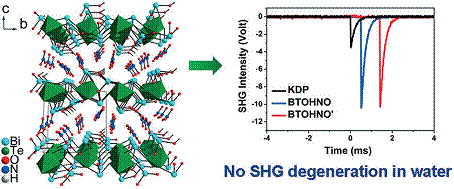

Nitrates have long been ignored for practical uses as nonlinear optical (NLO) materials because they usually very easily dissolve in water; despite this, the π-conjugated [NO3]- is among the most desirable NLO-active structural units.

(Image by Prof. Luo's group)
Recent studies led by Prof. Luo Junhua and Zhao Sangen from the Fujian Institute of Research on the Structure of Matter, Chinese Academy of Sciences, resulted in a new water-resistant NLO material, Bi3TeO6OH(NO3)2(BTOHNO), which consists of three structural chromophores including Bi3O6OH short chains with 6s2 lone pair electrons, distorted TeO6 octahedra with d10 electrons, and π-conjugated [NO3]- triangles. Owing to the cooperative effect of three chromophores, BTOHNO shows an enhanced phase-matchable NLO response of 3 ×KH2PO4, which exceeds those of most nitrate NLO materials.
Remarkably, the authors found BTOHNO was highly resistant to water as it did not show obvious weight loss and decay of NLO response after being dipped into de-ionized water for 24 h.
Co-authors Prof. Lin Zheshuai et al from the Technical Institute of Physics and Chemistry, Chinese Academy of Sciences, performed theoretical calculations and found that the adsorption of a foreign water molecule in the BTOHNO crystal lattice is an endothermic process with an adsorption energy of +790 meV, which theoretically confirmed the water-resistance of BTOHNO.
The authors deem that it is an effective approach to developing practical nitrate NLO materials of high water-resistance and good optical performance by introducing diverse chromophores into the nitrate systems.
The study entitled “Cooperation of Three Chromophores Generates the Water-Resistant Nitrate Nonlinear Optical Material Bi3TeO6OH(NO3)2” has been published in Angew. Chem. (2017, 129, 555–559).
The cooperation of three chromophores in Bi3TeO6OH(NO3)2 leads to a strong second-harmonic generation that does not degenerate in water.
Contact:
Prof. Luo Junhua
Fujian Institute of Research on the Structure of Matter
Chinese Academy of Sciences
E-mail: jhluo@fjirsm.ac.cn